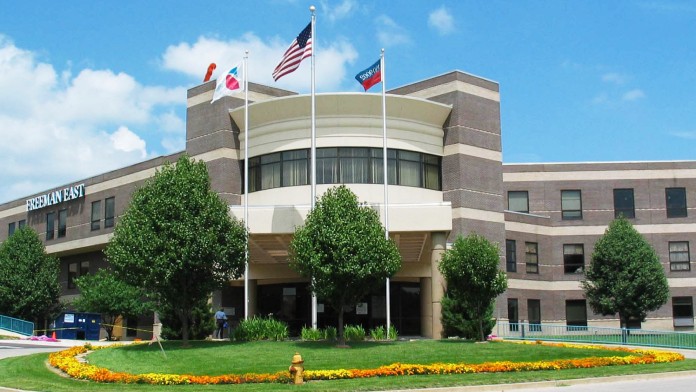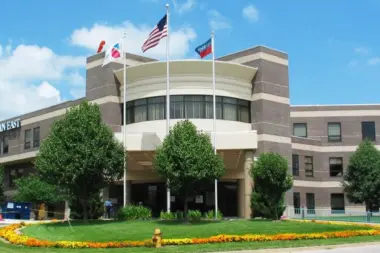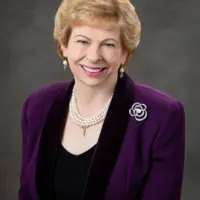Nurses are rude, unknowledgeable and clueless. It was enough to make this experience awful.
About Freeman Behavioral Health Services
You’ll find Freeman Behavioral Health Services based in Joplin, Missouri. Their Ozark Center, located nearby on Wisconsin Avenue, is the largest provider of behavioral health services in the Joplin area. It has 72 beds. There, they’ll address your behavioral and mental health needs and concerns. Whether you’re in need of crisis care or outpatient treatment, their New Directions program offers several pathways that can assist you with your personal journey.
Largest Provider of Behavioral Health Services in Joplin
Part of the larger Freeman Health System, their award-winning services offer a comfortable and caring environment to help you navigate your treatment and prepare you to return to a healthier lifestyle.
In addition, Ozark is the first of its kind to provide an urgent care option as an alternative to emergency care for behavioral health and substance use disorder needs. This provides you with a great option if you quickly need an emergency supply of medication, are experiencing a mental health crisis, or if you missed an appointment with your therapist.
Encourages Accountability and Promotes Family Engagement
While at Ozark, it’s good to know that they always support your family’s involvement during your treatment, and that their primary focus is on providing you with a healing environment that suits your needs. There’s a special track for seniors with care for Alzheimer’s, and lab work is done onsite. There’s also a cafeteria and gift shop if you need to just decompress a bit.
Referrals to their New Directions program at Ozark can be made through law enforcement officers and court systems, walk-ins or self-referrals and other medical and health care professionals. Please note that when you do walk in, you can only use cell phones in the main foyer.
You’re never turned away for services at Ozark as their goal is to not only treat your immediate disorders and issues, but also make sure you are emotionally and physically prepared to return to your commitments and routines. Therefore, their program walks with you, through every step of your healing journey until you are comfortable in your new healthier lifestyle.
Freeman Celebrates its 100th Year of Service in 2025
With over a century’s worth of experience, Freeman is focused on continuing to provide you and the Ozark community with comprehensive care to treat addiction and mental health issues through their inpatient or outpatient services, regardless of age or cultural background.
Payments for your services can be made with most insurance plans, including Medicaid and Medicare. Freeman encourages you to inquire with their admissions team about any questions you may have when it comes to paying for your services.
Facility Overview
Latest Reviews
Rehab Score
Gallery


Accepted Insurance
Other Forms of Payment
Medicaid is a state based program that helps lower-income individuals and families pay for healthcare. Medicaid covers addiction treatment so those enrolled can use their coverage to pay for rehab. When a program accepts Medicaid the client often pays very little or nothing out of their own pocket.
Private insurance refers to any kind of healthcare coverage that isn't from the state or federal government. This includes individual and family plans offered by an employer or purchased from the Insurance Marketplace. Every plan will have different requirements and out of pocket costs so be sure to get the full details before you start treatment.
Self-pay involves paying for treatment out of your own pocket. You can use savings or credit, get a personal loan, or receive help from family and friends to fund your treatment. If you don't have insurance or your insurance plan doesn't cover a specific program, self-pay can help ensure you still get the care you need.
Medicare is a federal program that provides health insurance for those 65 and older. It also serves people under 65 with chronic and disabling health challenges. To use Medicare for addiction treatment you need to find a program that accepts Medicare and is in network with your plan. Out of pocket costs and preauthorization requirements vary, so always check with your provider.
Military members, veterans, and eligible dependents have access to specific insurance programs that help them get the care they need. TRICARE and VA insurance can help you access low cost or no cost addiction and mental health treatment. Programs that accept military insurance often have targeted treatment focused on the unique challenges military members, veterans, and their families face.
Addiction Treatments
Levels of Care
Residential treatment programs are those that offer housing and meals in addition to substance abuse treatment. Rehab facilities that offer residential treatment allow patients to focus solely on recovery, in an environment totally separate from their lives. Some rehab centers specialize in short-term residential treatment (a few days to a week or two), while others solely provide treatment on a long-term basis (several weeks to months). Some offer both, and tailor treatment to the patient's individual requirements.
Treatments
Many of those suffering from addiction also suffer from mental or emotional illnesses like schizophrenia, bipolar disorder, depression, or anxiety disorders. Rehab and other substance abuse facilities treating those with a dual diagnosis or co-occurring disorder administer psychiatric treatment to address the person's mental health issue in addition to drug and alcohol rehabilitation.
Mental health rehabs focus on helping individuals recover from mental illnesses like bipolar disorder, clinical depression, anxiety disorders, schizophrenia, and more. Mental health professionals at these facilities are trained to understand and treat mental health issues, both in individual and group settings.
Programs
Adult rehab programs include therapies tailored to each client's specific needs, goals, and recovery progress. They are tailored to the specific challenges adult clients may face, including family and work pressures and commitments. From inpatient and residential treatment to various levels of outpatient services, there are many options available. Some facilities also help adults work through co-occurring conditions, like anxiety, that can accompany addiction.
Young adulthood can be an exciting, yet difficult, time of transition. Individuals in their late teens to mid-20s face unique stressors related to school, jobs, families, and social circles, which can lead to a rise in substance use. Rehab centers with dedicated young adult programs will include activities and amenities that cater to this age group, with an emphasis on specialized counseling, peer socialization, and ongoing aftercare.
Clinical Services
Whether a marriage or other committed relationship, an intimate partnership is one of the most important aspects of a person's life. Drug and alcohol addiction affects both members of a couple in deep and meaningful ways, as does rehab and recovery. Couples therapy and other couples-focused treatment programs are significant parts of exploring triggers of addiction, as well as learning how to build healthy patterns to support ongoing sobriety.
Experiential therapy is a form of therapy in which clients are encouraged to surface and work through subconscious issues by engaging in real-time experiences. Experiential therapy departs from traditional talk therapy by involving the body, and having clients engage in activities, movements, and physical and emotional expression. This can involve role-play or using props (which can include other people). Experiential therapy can help people process trauma, memories, and emotion quickly, deeply, and in a lasting fashion, leading to substantial and impactful healing.
Research clearly demonstrates that recovery is far more successful and sustainable when loved ones like family members participate in rehab and substance abuse treatment. Genetic factors may be at play when it comes to drug and alcohol addiction, as well as mental health issues. Family dynamics often play a critical role in addiction triggers, and if properly educated, family members can be a strong source of support when it comes to rehabilitation.
Group therapy is any therapeutic work that happens in a group (not one-on-one). There are a number of different group therapy modalities, including support groups, experiential therapy, psycho-education, and more. Group therapy involves treatment as well as processing interaction between group members.
In individual therapy, a patient meets one-on-one with a trained psychologist or counselor. Therapy is a pivotal part of effective substance abuse treatment, as it often covers root causes of addiction, including challenges faced by the patient in their social, family, and work/school life.
Nicotine Replacement Therapy (NRT) is a way of getting nicotine into the bloodstream without smoking. It uses products that supply low doses of nicotine to help people stop smoking. The goal of therapy is to cut down on cravings for nicotine and ease the symptoms of nicotine withdrawal.
Nutrition therapy, aka medical nutrition therapy (MNT), is a way of treating physical, emotional, and medical conditions through diet. Specific dietary plans are designed by professional nutritionists or registered dietitians, and patients follow them in order to positively affect their physical and mental health.
Trauma therapy addresses traumatic incidents from a client's past that are likely affecting their present-day experience. Trauma is often one of the primary triggers and potential causes of addiction, and can stem from child sexual abuse, domestic violence, having a parent with a mental illness, losing one or both parents at a young age, teenage or adult sexual assault, or any number of other factors. The purpose of trauma therapy is to allow a patient to process trauma and move through and past it, with the help of trained and compassionate mental health professionals.
Staff

Paula Baker
President & CEO

Steve Graddy
CFO

Jeff Thompson, PharmD
Chief Clinical Officer

David L. Baker, DO
Chief Medical Officer

Jeanee' Kennedy
Chief Nursing Officer
Contact Information
932 East 34th street
Joplin, MO 64804
